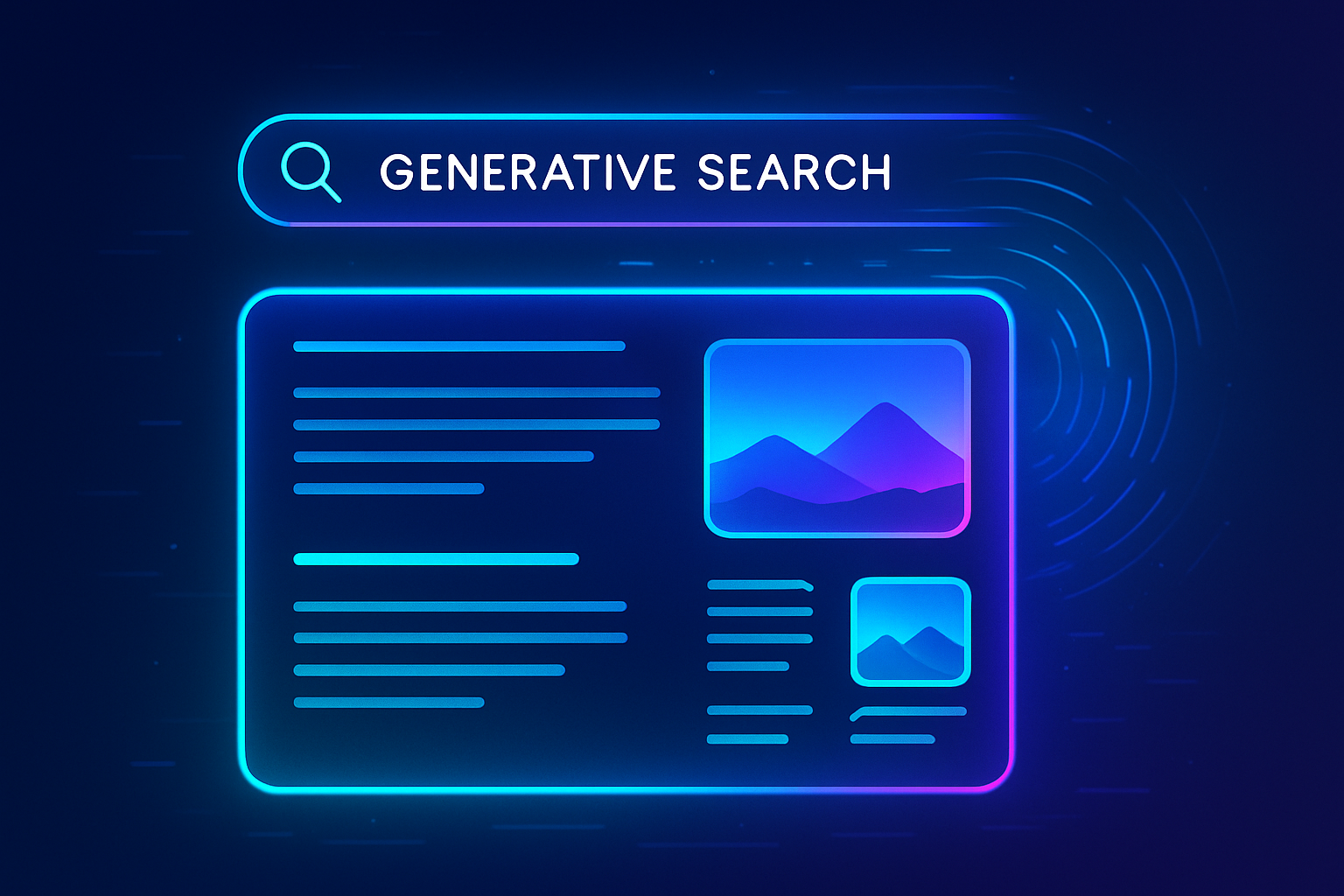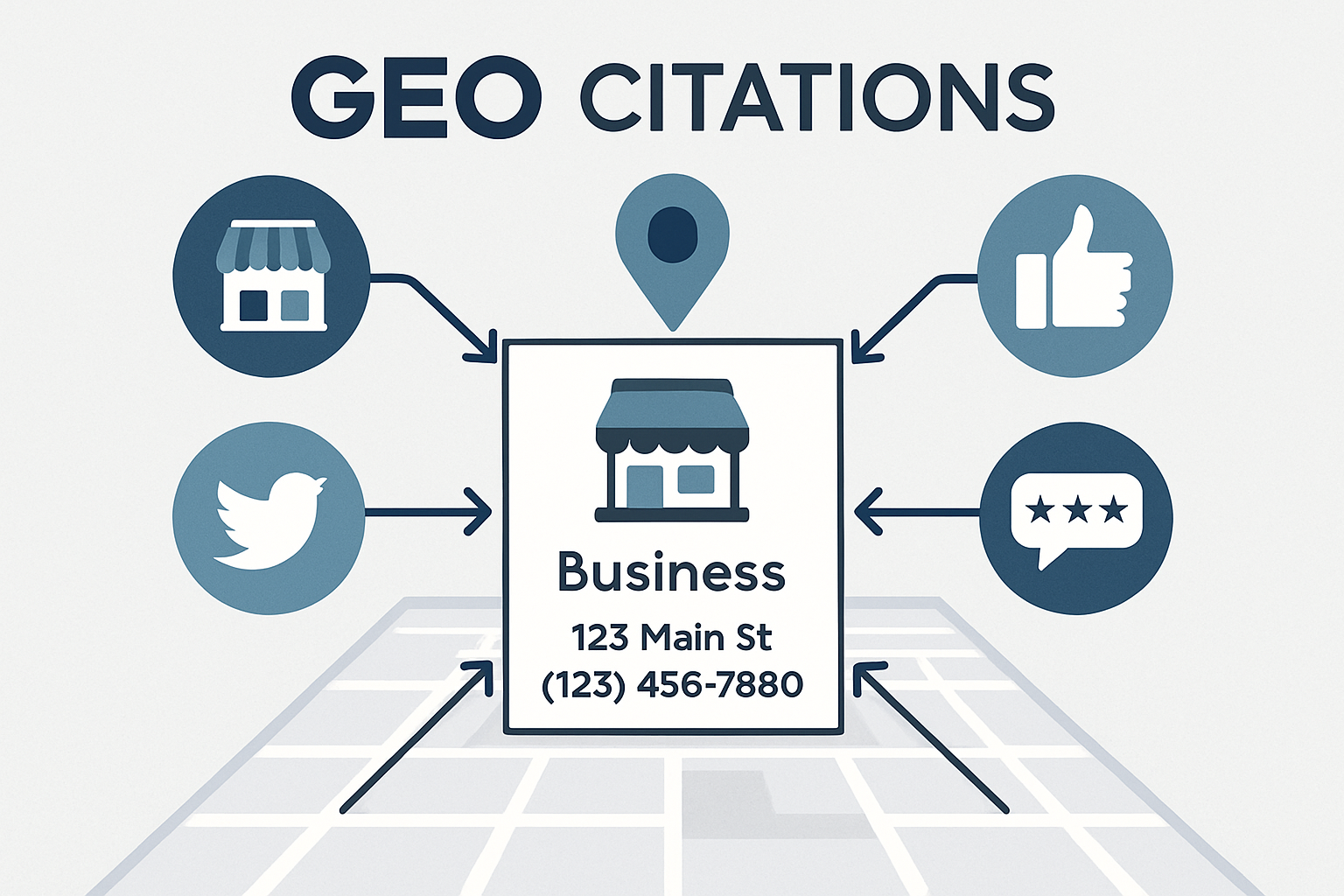The Complete Guide to Generative Engine Optimization (GEO)
Bottom Line Up Front: Generative Engine Optimization (GEO) is replacing traditional SEO as the primary strategy for digital visibility. With AI platforms like ChatGPT and Google’s AI Overviews now answering billions of queries daily without sending users to websites, brands that don’t optimize for AI citation risk being invisible. Companies implementing GEO strategies achieve 185% higher brand authority scores and a 240% improvement in pipeline quality within 8-12 months.
The rules of search have changed forever.
While you were optimizing for Google’s blue links, a quiet revolution was happening. ChatGPT processes over a billion queries daily. Google’s AI Overviews now appear in more than 50% of searches. Perplexity, Claude, and dozens of other AI platforms are answering millions of questions without ever sending users to your website.
Here’s the reality: Traditional search volume is predicted to drop 25% by 2026, replaced by traffic from generative engines like ChatGPT. If you’re not optimizing for AI citation, you’re not just losing traffic—you’re becoming invisible.
Welcome to the era of Generative Engine Optimization (GEO).
This comprehensive guide reveals exactly how to optimize your content for AI engines, build authority across multiple AI platforms, and position your brand as the go-to source that AI systems trust and cite.
TABLE OF CONTENTS:
- What is Generative Engine Optimization (GEO)?
- Why GEO is Critical for 2025 Success
- How Generative Engines Work vs Traditional Search
- The 6-Step GEO Implementation Framework
- Essential GEO Tools and Platforms
- Measuring GEO Success and ROI
- Common GEO Mistakes to Avoid
- The Future of GEO in 2025 and Beyond
- Key Takeaways: Your GEO Success Blueprint
- Related Video
What is Generative Engine Optimization (GEO)?
Generative Engine Optimization (GEO) is the process of making your content quotable by AI systems, such as ChatGPT, Google’s AI Overviews, Perplexity, and Claude. Unlike traditional SEO, which focuses on ranking web pages in search results, GEO optimizes content to be discovered, understood, and cited by AI systems that generate direct answers.
You’re no longer trying to be top of page one. You’re trying to be part of the answer itself.
How GEO Differs from Traditional SEO
Traditional SEO Process:
- User types a query into the search engine
- The search engine returns a ranked list of websites
- User clicks through to multiple sites for information
- Success is measured by clicks and rankings
GEO Process:
- User asks a question to the AI platform
- AI synthesizes information from multiple sources
- AI generates a comprehensive answer with citations
- Success is measured by citations and mentions
The Core GEO Philosophy
GEO isn’t about keyword stuffing or backlink chasing. It rewards content that’s genuinely useful, structured clearly, and built on trust. The best content gets cited because it provides undeniable value.
Key GEO Principles:
- Answer-First Structure: Lead with direct, comprehensive responses
- Semantic Clarity: Focus on meaning and context over keywords
- Authority Building: Establish expertise through citations and credentials
- Multi-Platform Optimization: Optimize for all AI engines simultaneously
Why GEO is Critical for 2025 Success
The data tells a compelling story about why GEO has become essential for modern businesses:
The Scale of AI Search Adoption
- ChatGPT: Over 1 billion queries processed daily
- Google AI Overviews: Appear in 50%+ of all searches
- Perplexity: Sees 20% monthly search growth
- Overall Growth: 21.64% increase in AI-powered Google searches from 2023 to 2024
The Business Impact
Early adopters who master GEO are seeing remarkable results:
- 185% higher brand authority scores within 8-12 months
- 240% improved pipeline quality from organic channels
- Reduced customer acquisition costs through improved AI visibility
The Competitive Advantage
Few companies dedicate resources to GEO, despite recognizing its growing importance. While your competitors focus on traditional SEO, you can capture AI-driven market share.
The Risk of Inaction
For businesses seeking external expertise in this evolving landscape, exploring the services of leading AEO agencies can provide specialized support in navigating generative engine optimization strategies.
Consider this scenario: A potential customer asks ChatGPT for recommendations in your industry. The AI cites three competitors but fails to mention your brand. They research those companies, book demos, and make decisions—all without ever discovering you exist.
This isn’t hypothetical: 89% of B2B buyers use AI platforms like ChatGPT for research. If you’re missing from AI responses, you’re missing deals.
How Generative Engines Work vs Traditional Search

Understanding the fundamental differences between traditional search engines and AI platforms is crucial for an effective GEO strategy.
Traditional Search Engine Process
Google’s Approach:
- Crawling: Bots discover and index web pages
- Ranking: Algorithm evaluates 200+ factors (keywords, backlinks, page speed)
- Results Display: Returns ranked list of relevant URLs
- User Journey: Users click through multiple sites for information
Generative Engine Process
AI Platform Approach:
- Query Understanding: AI interprets user intent and context
- Source Retrieval: System searches multiple knowledge sources
- Information Synthesis: AI combines information from various sources
- Answer Generation: Creates a comprehensive response with citations
- Source Attribution: Cites most relevant and authoritative sources
Key Differences in Content Evaluation
| Traditional SEO | Generative Engine Optimization |
|---|---|
| Keyword density and placement | Semantic meaning and context |
| Backlink quantity and quality | Content authority and trustworthiness |
| Page loading speed | Answer completeness and accuracy |
| Domain authority | Source credibility and expertise |
| Technical optimization | Information extractability |
How AI Systems Choose Sources
Research findings show AI platforms prioritize different sources:
ChatGPT’s Top Citation Sources:
- Wikipedia: 48% of top citations
- Reddit: 11% of citations
- High-authority news sites
- Educational institutions
- Government sources
Google AI Overviews Sources:
- YouTube content
- High-authority websites
- Featured snippet-eligible pages
- Schema-marked content
- Recently updated content
The 6-Step GEO Implementation Framework
Successful GEO requires a systematic approach that addresses content, technical optimization, and authority building across multiple AI platforms.
Step 1: Foundation Setting (Weeks 1-2)
For online retailers, this means focusing on improving AI search visibility for products to ensure their offerings are recommended in generative AI responses. This tailored strategy can directly impact online sales and brand discovery.
For businesses looking to refine their AI optimization strategies, exploring advanced AEO implementation services can provide the specialized expertise needed to navigate complex technical requirements and achieve superior results in generative search environments.
AI Visibility Audit
- Test your brand mentions across ChatGPT, Perplexity, Claude, and Google AI Overviews.
- Document current citation frequency and context.
- Identify gaps where competitors appear but you don’t.
- Assess content quality and structure for AI optimization.
Competitor AI Analysis
- Research which brands consistently get cited in your industry
- Analyze their content structure and authority signals
- Identify content gaps and opportunities
- Document successful citation patterns
Step 2: Content Optimization (Weeks 3-6)
Answer-First Content Structure Start every piece of content with a direct, 40-60-word response:
Quick Answer: Generative Engine Optimization (GEO) involves optimizing content for AI systems like ChatGPT and Google’s AI Overviews to earn citations in AI-generated responses. Unlike traditional SEO, which focuses on rankings, GEO prioritizes being quoted and referenced by AI platforms that synthesize information for users.
Question-Based Headers Structure content around questions users actually ask:
- “What is Generative Engine Optimization?”
- “How Does GEO Differ from Traditional SEO?”
- “Why is GEO Important for Business Success?”
Comprehensive Topic Coverage: Build comprehensive content clusters around core topics to establish topical authority.
Step 3: Authority Building (Weeks 4-8)
Expert Positioning
- Add author bylines with credentials and expertise
- Include citations from authoritative sources
- Demonstrate first-hand experience through case studies
- Build comprehensive topic coverage
Cross-Platform Presence
- Build Wikipedia citations through notable achievements
- Engage meaningfully in Reddit communities
- Contribute to industry publications and forums
- Develop social proof and community validation
Step 4: Technical Implementation (Weeks 3-5)
Schema Markup Optimization
{
“@context”: “https://schema.org”,
“@type”: “Article”,
“headline”: “Complete Guide to GEO”,
“author”: {
“@type”: “Person”,
“name”: “Eric Siu”
},
“publisher”: {
“@type”: “Organization”,
“name”: “Single Grain”
}
}
Performance Optimization
- Achieve Core Web Vitals compliance
- Implement mobile-first design
- Optimize page loading speeds
- Ensure accessibility standards
Step 5: Cross-Platform Optimization (Weeks 6-10)
Google AI Overviews
- Implement FAQ and HowTo schema markup
- Create a question-based content structure
- Focus on comprehensive answer coverage
- Include supporting evidence and examples
ChatGPT Optimization
- Create Wikipedia-style encyclopedic content
- Build Reddit-worthy community value
- Establish educational authority through citations
- Include recent updates and current information
Step 6: Monitoring and Optimization (Ongoing)
Performance Tracking
- Monitor AI citations across all platforms
- Track brand mention sentiment and context
- Measure traffic and conversion from AI sources
- Analyze competitor citation changes
Content Refinement
- Update content based on AI feedback and performance
- Expand successful content into comprehensive clusters
- Address new questions and emerging topics
- Optimize underperforming content
Essential GEO Tools and Platforms
Success in GEO requires the right tools for monitoring AI mentions, analyzing performance, and optimizing content across multiple platforms.
AI Monitoring and Analytics Platforms
Enterprise GEO Solutions
BrandRadar by Ahrefs
- Tracks brand mentions in AI Overviews
- Monitors sentiment across AI-generated content
- Competitive analysis of AI citations
- Integration with existing Ahrefs workflow
Semrush AI Toolkit
- Dedicated GEO performance tracking
- Cross-platform AI mention monitoring
- Content optimization recommendations
- ROI analysis for AI optimization efforts
Specialized GEO Platforms
Profound
- Fine-tunes models to mirror brand-relevant prompts
- Runs synthetic queries at scale across AI platforms
- Organizes outputs into actionable dashboards
- Tracks competitive share of voice in AI responses
Writesonic GEO Platform
- Tracks and boosts brand visibility in AI search results
- Provides content gap analysis for AI optimization
- Creates GEO-optimized content at scale
- Monitors competitor AI performance
Free and Budget-Friendly Options
Manual Monitoring Solutions
- Weekly searches across ChatGPT, Perplexity, and Claude
- Document citation frequency and context
- Track brand mention accuracy and sentiment
- Monitor competitor presence
Google Analytics 4 Enhanced Setup
- Track AI-attributed traffic with custom events
- Monitor conversion rates from AI sources
- Analyze user behavior from AI-generated traffic
- Calculate ROI from GEO optimization efforts
Tool Integration Strategy
Tier 1: Foundation (Budget < $500/month)
- Google Search Console
- Manual AI platform monitoring
- Basic schema validation tools
- Google Analytics 4 with custom tracking
Tier 2: Professional (Budget $500-$2000/month)
- Ahrefs BrandRadar
- Semrush AI Toolkit
- Advanced Web Ranking AI tracking
- Custom analytics implementation
Tier 3: Enterprise (Budget $2000+/month)
- Profound or similar enterprise GEO platform
- Full competitive intelligence suite
- Custom development for specific needs
- Dedicated GEO analytics dashboard
Measuring GEO Success and ROI
Measuring GEO effectiveness requires tracking both traditional metrics and new AI-specific performance indicators that directly correlate with business outcomes.
Primary GEO Metrics Framework

AI Citation Rate
Citation Rate = (Brand Citations in AI Responses / Total Relevant Queries Tested) × 100
Share of AI Voice
AI Voice Share = (Your Brand Citations / Total Industry Citations) × 100
AI-Attributed Revenue Impact
AI ROI = ((AI-Attributed Revenue – GEO Investment) / GEO Investment) × 100
Performance Tracking Implementation
Google Analytics 4 Setup for AI Tracking:
// Custom dimension for AI traffic source
gtag(‘config’, ‘GA_TRACKING_ID’, {
custom_map: {‘custom_parameter_1’: ‘ai_platform_source’}
});
// Track AI-attributed conversions
gtag(‘event’, ‘conversion’, {
‘source_medium’: ‘ai_platform’,
‘platform_type’: ‘chatgpt|perplexity|claude’,
‘citation_type’: ‘direct|indirect’,
‘value’: conversion_value
});
Business Impact Measurement
Pipeline Quality Metrics Companies implementing GEO strategies see 240% improved pipeline quality from organic channels. Track:
- Lead Quality Scores: AI-sourced leads vs traditional leads
- Sales Cycle Length: Time from AI discovery to conversion
- Deal Size Impact: Revenue per deal from AI-attributed sources
- Customer Retention: LTV of customers discovered through AI
Performance Benchmarks by Timeline:
- Weeks 1-4: Technical optimizations show initial AI recognition
- Months 2-3: Content optimizations drive citation frequency increases
- Months 4-6: Authority-building efforts compound for sustained growth
- Months 6-12: Market leadership position established in AI responses
Common GEO Mistakes to Avoid
Understanding what prevents GEO success is crucial for avoiding costly mistakes that can sabotage your AI visibility efforts.
Content and Strategy Mistakes
- Treating GEO Like Traditional SEO Mistake: Using keyword stuffing and traditional SEO tactics for AI optimization. Solution: Focus on natural language, comprehensive answers, and genuine value.
- Incomplete Answer Coverage Mistake: Only answering the primary question without addressing related concerns. Solution: Anticipate and answer follow-up questions within your content.
- Ignoring Platform-Specific Preferences Mistake: Using identical content strategies across all AI platforms. Solution: Customize content approach for each platform’s unique requirements.
Technical Implementation Errors
- Missing Schema Markup Mistake: Not implementing structured data or using the wrong schema types. Solution: Implement appropriate schema markup and validate regularly.
- Poor Mobile Optimization Mistake: Optimizing primarily for desktop when AI searches are mobile-first. Solution: Prioritize mobile user experience and loading speed.
Authority and Trust Issues
- Lack of Author Attribution Mistake: Publishing content without clear author bylines or credentials. Solution: Include comprehensive author information with relevant expertise.
- Insufficient Source Citations Mistake: Making claims without citing authoritative sources. Solution: Cite credible sources and include proper attribution throughout content.
Strategic Planning Mistakes
- Targeting Only Competitive Keywords Mistake: Focusing on highly competitive terms where established players dominate. Solution: Target long-tail, specific queries with less entrenched competition.
- Inadequate Resource Allocation Mistake: Treating GEO as a side project without dedicated resources. Solution: Allocate appropriate budget and team resources for sustained GEO efforts.
The Future of GEO in 2025 and Beyond

Generative AI continues evolving rapidly, with new platforms, technologies, and opportunities emerging regularly.
Emerging AI Platform Trends
Multimodal AI Evolution Generative engines are increasingly capable of processing and delivering responses across multiple formats, including text, images, videos, and audio.
Key Developments:
- Google Lens: 20 billion visual searches monthly, requiring optimized media assets
- Voice Search Growth: Smart speaker usage has experienced a 2.5% growth from 2024
- Combined Inputs: AI platforms processing text-image combinations simultaneously
Platform-Specific Evolution
Apple’s AI Search Integration. With Apple’s announcement that AI-native search engines like Perplexity and Claude will be built into Safari, Google’s distribution chokehold is in question.
Microsoft’s AI Search Expansion. Microsoft’s $14 billion investment in OpenAI creates strong integration between ChatGPT and Bing, making Bing optimization increasingly relevant for ChatGPT citations.
Strategic Planning for GEO’s Future
Short-Term Priorities (Next 12 Months):
- Establish a strong foundation across existing major platforms
- Implement comprehensive multimodal content optimization
- Build authority signals and expert positioning
- Develop systematic monitoring and optimization processes
Long-Term Vision (3+ Years):
- Position as industry thought leader cited across all AI platforms
- Develop proprietary AI integration or platform partnerships
- Create content that shapes AI’s understanding of industry topics
- Establish sustainable competitive advantages in AI search
Key Takeaways: Your GEO Success Blueprint
Generative Engine Optimization represents the most significant shift in digital marketing since the emergence of search engines. The brands that master GEO now will own the conversations in their industries for years to come.
The Essential GEO Formula:
- Authority-First Content: Create comprehensive, expert-level content that AI systems naturally want to cite
- Cross-Platform Optimization: Build presence across Google AI, ChatGPT, Perplexity, Claude, and emerging platforms
- Technical Excellence: Implement proper schema markup, ensure fast loading, and optimize for AI discovery
- Systematic Monitoring: Track AI citations, measure ROI, and continuously optimize based on performance data
Your 30-Day GEO Quick Start:
Week 1: Test your brand mentions across all major AI platforms and document your current citation
Week 2: Implement basic schema markup on your top 10 most essential pages
Week 3: Optimize your best-performing content with direct answer formats and authority signals
Week 4: Set up monitoring systems and create your first comprehensive, citation-worthy content piece
The Investment Case:
Companies implementing comprehensive GEO strategies report:
- 185% higher brand authority scores within 8-12 months
- 240% improved pipeline quality from organic channels
- Reduced customer acquisition costs through improved AI visibility
- Sustainable competitive advantages as AI search continues growing
Ready to Dominate AI Search?
The AI search revolution is happening now, and the brands that establish authority in AI platforms today will lead their industries tomorrow. At Single Grain, we’ve developed proven GEO methodologies that consistently get our clients cited across ChatGPT, Google AI Overviews, Perplexity, and emerging AI platforms.
Want to explore how our SEO services can accelerate your GEO success? Our team specializes in helping businesses navigate this new search reality while building sustainable competitive advantages for the AI-driven future. Get Your Free Consultation and discover how we can help you implement these GEO strategies, build cross-platform AI authority, and capture market share in AI-powered search.
Related Video
https://www.youtube.com/watch?v=PmKPtCUZlCE




